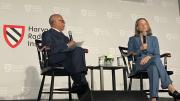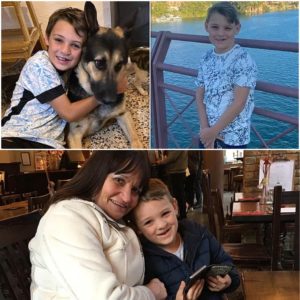On May 9, 2025, the Harvard Radcliffe Institute hosted its annual Radcliffe Day, a prestigious event celebrating individuals who embody excellence, inclusion, and social impact. This year, the Radcliffe Medal was awarded to Academy Award-winning actress and filmmaker Jodie Foster, a figure long celebrated for her barrier-breaking career in Hollywood and her advocacy for marginalized communities, particularly LGBTQ+ youth. However, what was meant to be a celebratory occasion quickly turned into a moment of profound shock and introspection as Foster delivered a speech that left the audience—and the wider public—reeling with its raw honesty, emotional depth, and unexpected revelations.
Foster, who graduated magna cum laude from Yale in 1985 with a degree in African American literature, was no stranger to the academic world. Her connection to Radcliffe Day was further deepened by her reunion with Henry Louis Gates Jr., her undergraduate adviser at Yale and now the Alphonse Fletcher University Professor at Harvard. The event began with a panel discussion on women’s evolving roles in film and television, featuring industry luminaries like Amy Brenneman, Mira Nair, and Naomi McDougall Jones. The tone was optimistic, focusing on progress and representation, but Foster’s keynote conversation with Gates shifted the atmosphere entirely, as she bared her soul in a way that few had anticipated.
A Speech That Broke All Expectations
Foster’s speech began with a reflection on her six-decade career, which started when she was just three years old, acting in commercials before rising to fame with roles in films like Taxi Driver (1976), The Accused (1988), and The Silence of the Lambs (1991), the latter two earning her Academy Awards for Best Actress. She spoke candidly about the challenges of growing up as a child actor, often the breadwinner for her family, and the burden of responsibility that came with it. “Because of her generation and her status as a pre-feminist woman, my mother wanted me to be respected above anything else,” Foster said of her mother, Brandy Foster, who managed her early career. “She propelled me into a career where she could feel respected because her daughter was respected. That was a big burden and a big responsibility.”
But it was when Foster delved into more personal territory that the audience began to sense the weight of her words. She spoke about the trauma she endured as an 18-year-old Yale freshman in 1981, when John Hinckley Jr., an obsessive fan, stalked her and later shot President Ronald Reagan in a twisted attempt to impress her. For the first time in a public setting, Foster detailed the aftermath of the incident: how she was forced into hiding, unable to live on campus or attend classes, and required round-the-clock security. “I don’t think I would have survived it intact if I’d been a young actor now,” she admitted, her voice trembling. “But in those days, the way to survive that was to say, ‘I am off limits. You can’t have me. You can have my art, but you can’t have all of me.’”
The audience, gathered in the rain-soaked Radcliffe Yard, fell silent as Foster’s words hung in the air. Her vulnerability was palpable, but it was her next revelation that truly shocked the room. Foster, who has been famously private about her personal life, spoke openly about her journey as a lesbian and the microaggressions she faced in the male-dominated film industry of the 1970s and 1980s. “When I was growing up, I never saw another woman,” she said, recalling how even makeup artists were usually men. “A lifetime of very small microaggressions and having to bend myself into a pretzel to accommodate spaces where I wouldn’t normally be welcome has allowed me to be a leader—the kind of leader that can take 175 people on a crew and say, ‘We’re in this together.’”
A Call to Action Through Love and Strategy
Foster’s speech took a political turn as she addressed the current climate in the United States, particularly in light of the Trump administration’s policies, which she noted had left many feeling “worn out and sad.” She praised Harvard for pushing back against these challenges and urged the audience to harness their intellectual power for good. “This group of thinkers in these rarified places, where the intellect and the ability to connect are really revered above all else, needs to really understand that you have the power to use love as a guiding principle and be strategic,” she said. Her words were a rallying cry, a reminder that even in the face of adversity, love and connection could be powerful tools for change.
Diana Nyad, the long-distance swimmer and journalist who collaborated with Foster on the 2023 film Nyad (where Foster played her trainer, Bonnie Stoll), provided a testimonial earlier in the day, describing Foster as an “egalitarian” who was unpretentious about her talents. Nyad’s words set the stage for Foster’s speech, highlighting her ability to connect deeply with others—a quality that shone through as she spoke about her advocacy for LGBTQ+ youth. Foster has long been a supporter of initiatives to improve the safety and well-being of this community, and her speech at Radcliffe Day reinforced her commitment to using her platform for social good.

The Emotional Climax: A Tribute to Motherhood
Perhaps the most shocking and emotional moment of Foster’s speech came when she spoke about her relationship with her mother, Evelyn Almond, who suffered from dementia before her passing. Foster fought back tears as she recalled her mother’s influence on her life and career. “Mom, I know you are inside those blue eyes somewhere,” she had said in a previous speech at the 2013 Golden Globes, and she echoed that sentiment at Radcliffe Day. “I hope that if I say this three times, you will magically and perfectly enter into your soul, fill you with grace and the joy of knowing that you did good in this life. You’re a great mom,” she said, her voice breaking. The audience, already moved by her earlier revelations, was brought to tears by this heartfelt tribute.
Foster also spoke about her own experience as a mother to her two sons, Charles and Christopher, whom she shares with her ex-partner Cydney Bernard. She reflected on the challenges of balancing her career with motherhood and the joy she finds in seeing her sons pursue their own paths—Charlie as an actor and Kit as a scientist. “Hopefully, you understand the joy, such joy that comes from doing really hard, meaningful, good work,” she said, addressing her sons directly.
A Legacy of Impact and Inspiration
As Foster concluded her speech, she hinted at a shift in her career priorities, much like she did during her 2013 Golden Globes acceptance speech for the Cecil B. DeMille Award. “I may never be up on this stage again, on any stage for that matter,” she said, echoing her earlier sentiments about change. “But I will continue to tell stories, to move people by being moved. It’s just that from now on, I may be holding a different talking stick.” Her words left the audience wondering what might come next for the actress and filmmaker, who has already achieved so much in her career.
Radcliffe Dean Tomiko Brown-Nagin, who presented Foster with the medal, praised her for using “the power of art to engage with existential questions that define the human experience.” Brown-Nagin noted that Foster’s work consistently focuses attention on critical issues and overlooked voices, a theme that was evident throughout her speech. The event concluded with a community reception, but the impact of Foster’s words lingered long after the attendees dispersed.
The Aftermath: A Speech That Resonated Globally
Foster’s speech at Radcliffe Day 2025 quickly became a topic of global conversation, much like her 2013 Golden Globes address, which had sparked varied interpretations about her sexuality and career plans. Social media platforms buzzed with reactions, with many praising her courage in addressing such personal and political topics. Others were moved by her emotional tribute to her mother, seeing it as a universal reflection on the complexities of familial love and loss.
Critics, however, noted that Foster’s speech, while powerful, was at times disjointed, reflecting the rawness of her emotions. Some felt that her call to action—using love as a guiding principle—was idealistic in the face of systemic challenges, but her supporters argued that this idealism was precisely what made her message so inspiring. As one attendee put it, “Jodie Foster’s speech was a testament to the fear, loneliness, and stubborn hope of someone who doesn’t feel she owes the world clarity but feels she owes herself, and history, some kind of truth.”
In the end, Jodie Foster’s speech at Radcliffe Day 2025 was a defining moment—not just for her, but for all who witnessed it. It was a reminder of the power of vulnerability, the importance of using one’s platform for good, and the enduring impact of love, in all its forms. As Foster continues to navigate her career and legacy, her words will undoubtedly inspire countless others to embrace their own truths and fight for a more just and connected world.

